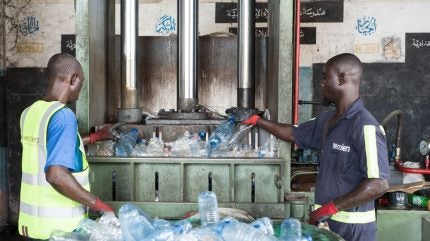
Lagos State and the Nigerian Conservation Foundation (NCF) have called for broad collaboration to tackle plastic pollution, using the annual Walk for Nature in Lagos on 1 November 2025 to press households and companies to cut waste and improve recycling.
State officials said enforcement of the single-use plastics ban is under way and highlighted ongoing programmes such as LAWMA’s Blue Box recycling initiative and wider “waste-to-wealth” schemes aimed at building a local circular economy.

Discover B2B Marketing That Performs
Combine business intelligence and editorial excellence to reach engaged professionals across 36 leading media platforms.
Plastic pollution in Lagos: scale of the challenge
Nigeria generates about 2.5 million tonnes of plastic waste each year, with Lagos contributing an estimated 870,000 tonnes and recycling rates in the low teens, according to recent reporting and academic reviews.
Local drains and waterways are frequently clogged by discarded packaging, compounding flood risk and harming marine life.
These impacts were a central theme at Walk for Nature, where speakers warned of microplastics entering food chains and urged behaviour change alongside better systems for collection and sorting.
Single-use plastics ban and current enforcement
Lagos authorities say full enforcement of the state ban on single-use plastics, including Styrofoam food packs and common disposables, began in 2025.

US Tariffs are shifting - will you react or anticipate?
Don’t let policy changes catch you off guard. Stay proactive with real-time data and expert analysis.
By GlobalDataIndependent coverage notes that compliance remains uneven, reflecting cost pressures and the limited availability of alternatives, but officials maintain that inspections and sanctions are increasing as the policy beds in.
The state’s waste agency, LAWMA, continues to expand separation-at-source under the Blue Box Programme to improve feedstock quality for recycling.
Extended Producer Responsibility and industry role
Speakers at the event urged manufacturers and retailers to strengthen Extended Producer Responsibility (EPR) for packaging, redesigning formats, funding collection, and scaling take-back schemes.
Nigeria’s first packaging Producer Responsibility Organisation, the Food and Beverage Recycling Alliance (FBRA), has been expanding programmes with brands and recyclers; analysts argue that more consistent EPR funding and clearer targets are needed to lift recovery rates in Lagos and other cities.
Context for packaging companies: For global packaging and FMCG firms operating in Nigeria’s commercial capital, the policy direction is clear: tighter enforcement of single-use plastics restrictions, more emphasis on recyclability, and rising expectations on producer funding of collection and processing.
Companies seeking market access and supply stability are likely to face closer scrutiny of packaging choices, evidence of post-consumer recovery, and participation in accredited EPR schemes as Lagos accelerates its plastic pollution response.





